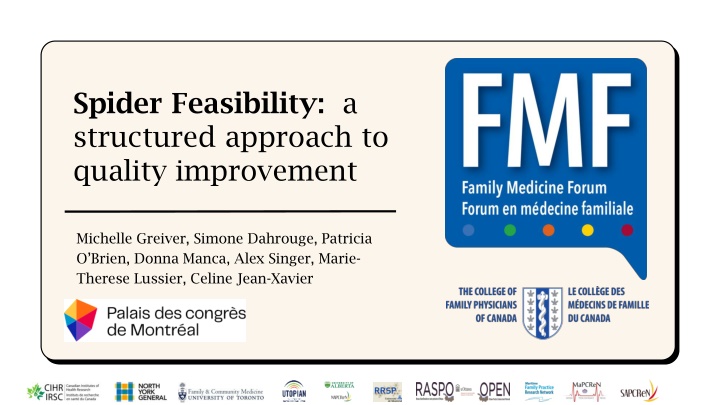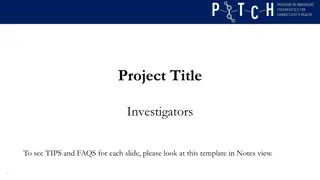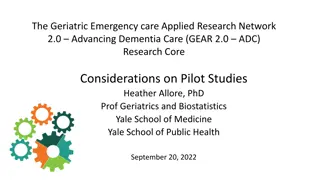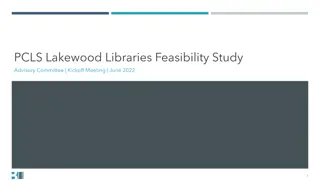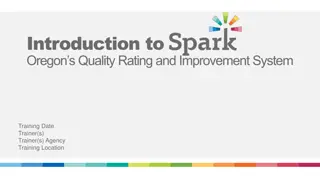Spider Feasibility: A Structured Approach to Quality Improvement
Polypharmacy among seniors is a prevalent issue with potentially harmful consequences. The SPIDER approach, focusing on medication appropriateness through evidence-based quality improvement initiatives, aims to address this challenge. Utilizing a structured process informed by data, evidence, and research, the approach emphasizes learning collaboratives, coaching, and leveraging electronic medical record data for audit and feedback. The feasibility study and clustered pragmatic randomized controlled trials aim to enhance medication management practices and improve patient outcomes among seniors.
Download Presentation

Please find below an Image/Link to download the presentation.
The content on the website is provided AS IS for your information and personal use only. It may not be sold, licensed, or shared on other websites without obtaining consent from the author.If you encounter any issues during the download, it is possible that the publisher has removed the file from their server.
You are allowed to download the files provided on this website for personal or commercial use, subject to the condition that they are used lawfully. All files are the property of their respective owners.
The content on the website is provided AS IS for your information and personal use only. It may not be sold, licensed, or shared on other websites without obtaining consent from the author.
E N D
Presentation Transcript
Spider Feasibility: a structured approach to quality improvement Michelle Greiver, Simone Dahrouge, Patricia O Brien, Donna Manca, Alex Singer, Marie- Therese Lussier, Celine Jean-Xavier
Presenter Disclosure Presenter: Michelle Greiver Relationships with financial sponsors: Any direct financial relationships, including receipt of honoraria: Grant to my Department from Sanofi, GSK and Novartis for development of a severe asthma registry using EMR data (unrelated to this project) Membership on advisory boards or speakers bureaus: None Patents for drugs or devices: None Other: None
Disclosure of Financial Support This program has received financial support from CIHR in the form of a Research Grant for SPIDER This program has received in-kind support from UofT DFCM and North York General Hospital in the form of logistical support Potential for conflict(s) of interest: Dr Greiver has receives payment from the UofT DFCM as a Research Program Advisor
Background Polypharmacy amongst seniors is prevalent, and may harm patients o 1 out of 4 Canadian seniors (26.5%) fill prescriptions for 10+ different meds each year1 o # of meds prescribed to a patient is the single most reliable index of persistent complexity after age2 10+ meds prescribed for seniors is strongly associated with high care needs for 3 consecutive years: specificity = 95.3%2 8 Percentage of older patients by # of 6 Odds of ongoing high medication classes healthcare costs 4 2 0 0 5 10 15 20 25 30 -2 # of meds 2. Dahrouge S, Wodchis W. Identifying high users in Ontario - an algorithm for use in primary care practices. in preparation 1. Canadian Institute for Health Information. Drug Use Among Seniors in Canada, 2016. Ottawa, ON: CIHI; 2018.
Background What to improve? o Medication Appropriateness: o use of potentially inappropriate meds PPIs benzos/Z-drugs antipsychotics sulfonylureas How could we improve? o SPIDER*: evidence-based QI initiatives How to measure the impact? o Quintuple Aim *SPIDER: Structured Process Informed by Data, Evidence and Research
The SPIDER approach Based on IHI s Breakthrough Series Model Core elements: Learning Collaboratives, coaching, EMR data for audit & feedback Feasibility study (3 PBRNs) clustered pragmatic RCTs (7 PBRNs)
Measures for feasibility Feasibility across 7 dimensions o Demand o Implementation o Adaptation o Integration o Practicality o Acceptability o Efficacy
Demand Sites PBRNs # approached #declined/no response # enrolled # withdrawn Total 10 3 4 17 Target # enrolled /# approached 8 8 8 24 15 8 4 27 5 4 0 9 10 4 4 18 0 1 0 1 UTOPIAN (Toronto) NAPCReN (Edmonton) RRSPUM (Montreal) 67% 50% 100% 67% Total Toronto 33 3 4 8 1 2 4 2 Edmonton 8 Montreal 21 5 Total 62 8 5 12 1 7 10 5 5 115 FPs NPs Nurses Pharmacists PAs QI agent Residents Admin Patients partners Total participants 1 4 3 6 1 2 2 5 57 19 39
Implementation Toronto Learning Collaborative Outcome measure Ability to apply the SPIDER elements as planned Implementation facilitators and barriers; best practices Data Source Coordinator s log Coordinator s log/ QI coach log Method and timing of data collection Maintained by RC and QI coach Audit and feedback Coaching notes Learning Collaborative Yes In some settings (Toronto) In some settings (Toronto); Scheduling was difficult
Adaptation, integration, practicality Outcome measure Data Source Ability to integrate the process into existing practice Semi-structured interview with selected practices Interview, post LC Method and timing of data collection o Change strategies varied Dependent on local context (capacity, resources and previous experience in QI) Solutions focused on Cleaning medication data in EMR Adding functionalities in EMR: e.g., CPP band, side panel, flag SPIDER patients Improving documentation of discussion and shared decision-making: e.g., customized deprescribing form Enhancing routine medication reconciliation: e.g., appointments specifically for med reconciliation/deprescription o Access to a Pharmacist was a key enabler
Acceptability o High level of engagement High willingness to share and high degree of collaboration Teams work documents were shared between sites Under-resourced teams received external pharmacist support: e.g., the solo practice and the CHC Higher than anticipated access to coaching support The majority had a monthly hour-long meeting with the coach Engagement of FM residents
Efficacy Toronto Average # of pts/physician: 24(range 6-116) Number of PIPs/patient: 1 (SD .8) Efficacy * PIP prevalence = # ?? ??? ?? ?????? ?????????? # ?? ???????? ?? ?????? ?????????? 3.6% (p = n. s.) Absolute reduction in PIP prevalence per patient* 1.4% (p = n. s.) Absolute reduction in % of patients with at least 1 PIP Baseline surveys completed 15 25 40 PCP enrolled Network Edmonton Toronto Total percentage 75% 43% 51% 20 58 78 Patient participants PBRNs # approached #declined/no response # enrolled 70 0 0 70 67 0 0 67 3 0 0 3 UTOPIAN NAPCReN RRSPUM Total
Conclusions Feedback and coaching can be implemented in practice Learning Collaboratives may present scheduling challenges Team resources were needed to support the intervention Access to coaching support and pharmacist services were important SPIDER was feasible, with a trend towards improved outcomes Pandemic required shift to Virtual Learning Collaboratives during RCT We used what we learned for the RCT
Thank you! Please fill out your session evaluation now! #myfmf michelle.greiver@nygh.on.ca https://www.spiderdeprescribing.com/ FamilyMedicineForum FamilyMedForum FamilyMedForum
